If you’re considering relocating to Italy, there are several pathways to obtaining residency, depending on your circumstances and goals. Below is a step-by-step guide to help you navigate the process.
Step 1: Determine Your Pathway to Residency
The first step in moving to Italy is identifying the most suitable visa or permit for your situation. Here are some common options:
∙ Student Visa: If you plan to study in Italy, this is a straightforward option. A student visa allows you to stay in Italy for the duration of your studies. Contact us if you wish to obtain a student visa through Italian language courses.
∙ Investment Visa: For those with financial resources, the investment visa provides a pathway to residency through significant economic investment in Italy. Find detailed information on Italy’s Investor Visa.
∙ Elective Residency Visa: Ideal for retirees or those with independent income, this visa allows you to reside in Italy without the need to work. Explore the elective residency visa (ERV) here.
∙ Switching from Student Permit to Self-Employed Permit: If you’re already in Italy on a student visa, you can transition to a self-employed permit. Discover the steps to make this switch.
∙ Digital Nomad Visa: Italy has introduced a residence permit for non-EU digital nomads, allowing highly skilled remote workers to live and work in Italy. Click here to learn more.
∙ Jure Sanguinis (Citizenship by Descent): If you have Italian ancestry, you may be eligible for citizenship through jure sanguinis, one of the most direct paths to becoming an Italian citizen. Learn about the process here.
∙ Residency for Unmarried Partners: If your partner is an EU citizen, you may qualify for residency, allowing you to live and work in Italy. Get the details on this process here.
∙ Work Visa: A work visa allows a non-EU citizen to legally reside and work in Italy. General requirements include a valid job offer from an Italian employer and a work permit obtained by the employer. Specific requirements and procedures can vary based on your nationality and the type of work visa you’re applying for.
Step 2: Gather the Necessary Documentation
Once you’ve chosen your pathway, the next step is to gather the required documentation. While the specific documents vary depending on the visa or permit, here’s a general list of what you might need:
∙ Valid Passport: Ensure your passport is up to date and has at least six months of validity.
∙ Visa Application Form: Complete the relevant application form for your visa type.
∙ Proof of Financial Means: Provide documentation proving you can support yourself financially in Italy.
∙ Health Insurance: Show proof of comprehensive health insurance coverage.
∙ Accommodation Details: Provide documentation showing where you will reside in Italy (e.g., lease agreement, property ownership).
∙ Criminal Background Check: Submit a police clearance certificate from your home country.
∙ Additional Documents: Depending on your visa type, you may need to provide specific documents such as enrollment confirmation for a student visa, proof of investment for an investment visa, or language proficiency certificates.
Step 3: Submit Your Visa Application
With your documents in hand, submit your visa application to the Italian consulate or embassy in your home country. Make sure to:
∙ Schedule an appointment well in advance.
∙ Pay the applicable visa fee.
∙ Attend the appointment with all required documents.
∙ Check the specific requirements and processing times for your visa type to avoid any delays.
Step 4: Relocate to Italy
Once your visa is approved, it’s time to make the move. Book your travel, secure accommodation, and plan the logistics of moving your belongings. If you have pets, ensure they meet the requirements to enter Italy.
Step 5: Apply for a Permesso di Soggiorno
Upon arrival in Italy, you’ll need to follow these procedures:
∙ Obtain a Codice Fiscale: This is your Italian tax code, necessary for various administrative tasks. Find out how to obtain your codice fiscale and where to get it depending on your type of residency permit.
∙ Register with the Comune: This involves registering your residence with the local city hall (Comune).
∙ Apply for a Permesso di Soggiorno: You must apply for a Permesso di Soggiorno (residence permit) within eight days of arriving in Italy. This permit is essential for legally staying in Italy long-term. The application process varies depending on your visa type and reason for staying.
Note: The specific requirements and timelines for Step 5 may vary depending on your individual circumstances. It’s advisable to consult with local immigration authorities or a legal professional for the most accurate and up-to-date information.
Step 6: Enjoy Your New Life in Italy!
With all the formalities completed, you can now immerse yourself in the Italian lifestyle. Whether you’re here to study, work, or retire, Italy offers a wealth of opportunities to enjoy la dolce vita. Read our blog about how to make friends in Italy.

Understanding Salaries in Italy: A Guide for Expats and Newcomers (2025)
If you’re an expat living in Italy or someone considering relocating, understanding the salary landscape remains a crucial element in planning your life in the country. This article provides an overview of average salaries in Italy, how they vary by profession, age, gender, education, and region, as well as how they compare to other European […]

Voters to Decide on June 8–9: Shorter Citizenship Wait and New Labor Protections
On Sunday, June 8, and Monday, June 9, 2025, Italian citizens eligible to vote will be called to the polls for a major referendum on five key issues affecting labor rights and citizenship. These abrogative referendums (under Article 75 of the Italian Constitution) allow voters to decide whether to repeal existing laws or specific legal […]
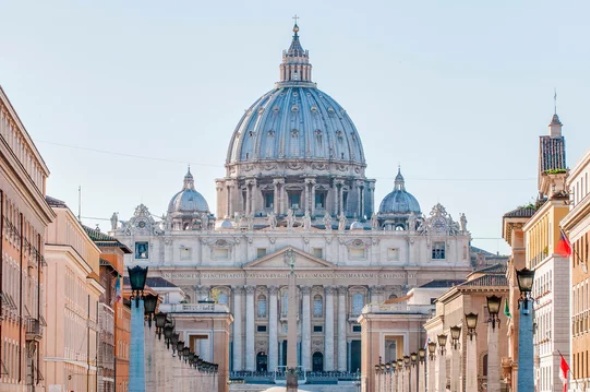
Conclave to Elect New Pope to Begin on May 7th
Following the passing of Pope Francis, a historic moment is once again unfolding in the heart of Rome. The Conclave to elect the 267th Pope will officially begin on May 7th, 2025, marking a major event in both the Catholic Church and Italian history. For expats living in Italy, understanding the significance of this process […]
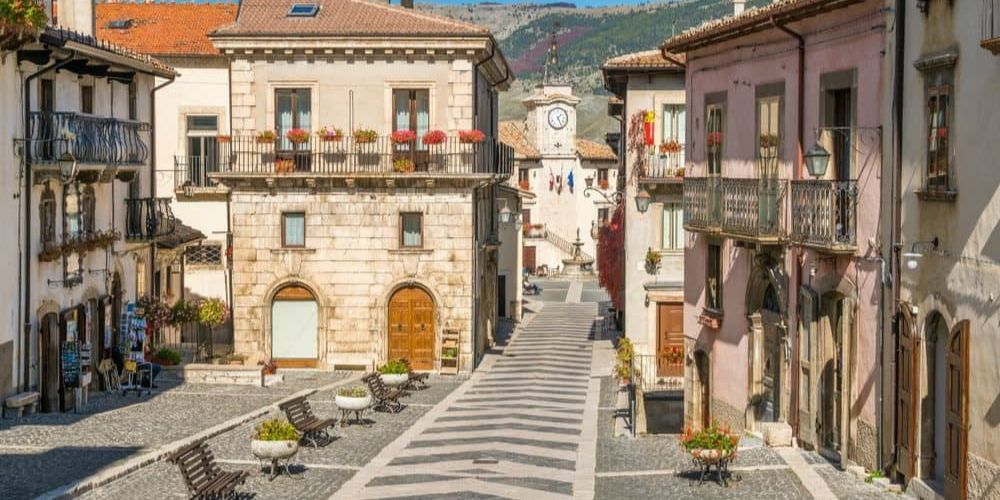
Living in Abruzzo, Italy: Retirement, Lifestyle, and Cost of Living (2025 Guide)
Why Choose Abruzzo? Abruzzo, located in central Italy between the Adriatic Sea and the Apennine Mountains, is a dream destination for those looking to retire or relocate for a more relaxed and affordable lifestyle. Known for its stunning landscapes, charming medieval villages, national parks, and friendly locals, Abruzzo offers an authentic Italian experience—without the crowds […]

A Guide to Getting Married in Italy to an Italian (2025 Edition)
If you’re a foreigner planning to marry an Italian in Italy in 2025, there are important legal steps to follow. This guide walks you through the process: Legal Requirements • Both partners must be at least 18 years old • Neither partner can be currently married • Divorce or death certificates must be provided if previously married Documents […]
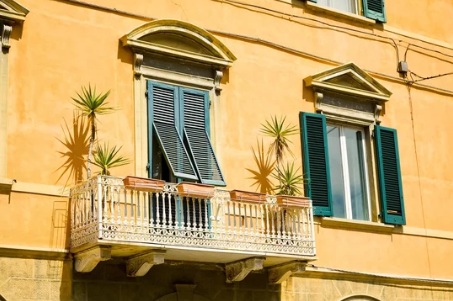
How to find an apartment in Rome: the ultimate expat guide
Guest Article written by helpmaterome.com Finding an apartment to rent in Rome is HARD. Demand for rentals is sky-high, so that little place you had your eye on last week has probably already gone by the time you pick up the phone to ask about it. You need to move quickly at all stages: calling, […]

Italy Observes Duelo: The Papal Demise and Transition
Italy has entered a period of official mourning, or duelo, following the passing of His Holiness Pope Francis I on April 21, 2025. For foreign residents within the capital, the customs and procedures associated with a papal demise and subsequent election may present unfamiliar traditions. This article endeavors to illuminate the role of the papacy, […]

Easter in Italy 2025: What to See, Eat, and Celebrate
Whether you’re religious or not, Easter is a great opportunity to visit Italy or acquire an Italian mindset. The weather is pleasant, and there are numerous intriguing customs to observe, ranging from sprinting monks and massive sculptures to colorful processions and larger-than-life reenactments. The Papal Mass and Urbi et Orbi Blessing in Vatican City The […]
Italy, a country renowned for its rich history, exquisite cuisine, and breathtaking landscapes, is also home to countless small towns that offer a more intimate and charming experience compared to the bustling cities. These lesser-known gems, each with a population under 10,000, boast incredible history, culinary delights, and stunning countryside views. This curated list from Travel and Leisure Magazine highlights twelve of the best small towns in Italy, each offering a unique slice of Italian culture and beauty on a smaller scale. From coastal villages to medieval hilltop towns, these destinations promise an unforgettable journey through Italy’s most picturesque locales.
Porto Venere, Liguria
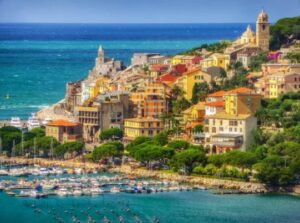
Porto Venere, also known as Portovenere, is a picturesque town located on the Ligurian coast of Italy, in the province of La Spezia. This charming fishing village is renowned for its colorful houses, historic churches, and stunning views of the Mediterranean Sea. Porto Venere, along with the nearby Cinque Terre and the islands of Palmaria, Tino, and Tinetto, is a UNESCO World Heritage Site. The town’s highlights include the Church of St. Peter, perched dramatically on a rocky promontory, and the Doria Castle, which offers panoramic views of the Gulf of Poets. With its blend of natural beauty, rich history, and vibrant culture, Porto Venere is a must-visit destination for anyone exploring the Italian Riviera.
Treia, Marche
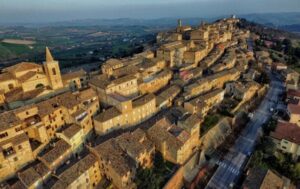
Treia is a picturesque town located in the province of Macerata, in the central region of Marche, Italy. Perched on a hilltop, Treia offers stunning panoramic views of the surrounding countryside and the Potenza river valley. The town is known for its well-preserved medieval architecture, including ancient walls and charming cobblestone streets. Key attractions include the Piazza della Repubblica, which is the heart of the town, and the Teatro Condominiale, a beautifully decorated 19th-century theatre. Treia also boasts a rich cultural heritage, with traditional events like the annual Disfida del Bracciale, a historic ball game. The local cuisine is another highlight, with specialties such as “calcione,” a delicious pastry filled with cheese. Treia’s blend of history, culture, and natural beauty makes it a hidden gem in the Marche region.
Anghiari, Tuscany
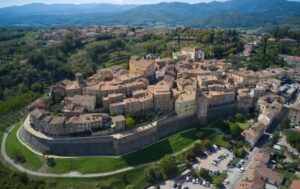
Anghiari is a charming medieval town located in the province of Arezzo, Tuscany. Nestled on a hill overlooking the Tiber River valley, Anghiari is renowned for its well-preserved historic architecture and picturesque streets. The town is famous for the Battle of Anghiari, a significant 1440 conflict between Florence and Milan, which was immortalized in a lost fresco by Leonardo da Vinci. Visitors can explore the ancient city walls, the Palazzo Pretoriano, and the Badia di San Bartolomeo. Anghiari’s narrow, cobblestone streets are lined with stone houses adorned with flowers, creating a beautiful and authentic medieval atmosphere. Recognized as one of the “most beautiful villages in Italy,” Anghiari offers a unique blend of history, culture, and scenic beauty, making it a must-visit destination in Tuscany.
Brisighella, Emilia-Romagna
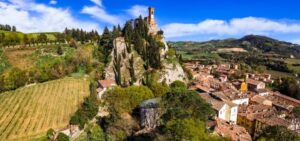
Brisighella, nestled in the picturesque Emilia-Romagna region of Italy, is a charming medieval village renowned for its historical and natural beauty. Located in the Lamone river valley, this enchanting town is framed by the Tuscan-Romagnolo Apennines and is celebrated for its three iconic hills, each crowned with a significant landmark: the Manfredian Fortress, the Clock Tower, and the Monticino Sanctuary. Brisighella’s narrow, winding streets and ancient architecture offer a glimpse into its rich past, while its status as a “Slow City” and a member of the “Most Beautiful Villages of Italy” underscores its commitment to preserving a tranquil and authentic atmosphere. Visitors can enjoy local delicacies such as the prized DOP Extra Virgin Olive Oil and Sangiovese wine, making it a perfect destination for food and wine enthusiasts. Whether exploring its historical sites or savoring its culinary delights, Brisighella promises a memorable and immersive experience.
San Vito Lo Capo, Sicily
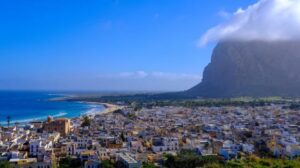
San Vito Lo Capo, located on the northwestern coast of Sicily, is a picturesque coastal town renowned for its stunning white sandy beaches and crystal-clear turquoise waters. Nestled between mountains, this charming town offers a blend of natural beauty and rich cultural heritage. The town’s main beach, Spiaggia San Vito lo Capo, is often hailed as one of the best in Italy, attracting visitors with its pristine sands and vibrant atmosphere. San Vito Lo Capo is also famous for its annual Couscous Fest, celebrating the town’s culinary ties to North Africa. Beyond the beach, visitors can explore historical landmarks such as the 15th-century Santuario de San Vito and enjoy outdoor activities like hiking and climbing in the surrounding mountainous terrain. Whether you’re looking to relax by the sea or immerse yourself in local culture, San Vito Lo Capo offers a delightful escape.
Cortina d’Ampezzo, Veneto
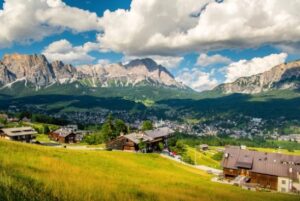
Cortina d’Ampezzo, often referred to as the “Queen of the Dolomites,” is a stunning alpine town located in the Veneto region of Northern Italy. Nestled in the heart of the southern Alps, this picturesque destination is renowned for its breathtaking scenery, world-class skiing trails, and vibrant après-ski scene. Cortina d’Ampezzo gained international fame as the host of the 1956 Winter Olympics and will be a host again for the 2026 Winter Olympics. It continues to attract visitors with its luxurious accommodations, high-end shops, and gourmet dining options. The town is surrounded by majestic peaks such as the Tofane, Cristallo, and Sorapiss, offering a paradise for outdoor enthusiasts year-round. Whether you’re hitting the slopes in winter or exploring the numerous hiking and climbing routes in summer, Cortina d’Ampezzo promises an unforgettable experience in one of Italy’s most beautiful mountain settings.
Tropea, Calabria
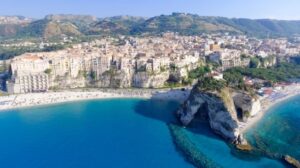
Tropea, often referred to as the “Pearl of the Tyrrhenian Sea,” is a stunning coastal town in Calabria, Italy. Perched on a cliff overlooking the sea, Tropea is renowned for its breathtaking views, crystal-clear waters, and beautiful sandy beaches. The town’s historic center is a maze of narrow streets lined with charming cafes, restaurants, and shops, all set against a backdrop of ancient buildings and churches. One of the most iconic landmarks is the Sanctuary of Santa Maria dell’Isola, a picturesque church situated on a rocky promontory. Tropea is also famous for its sweet red onions, which are celebrated in local cuisine and festivals. Whether you’re exploring its rich history, relaxing on its pristine beaches, or indulging in its culinary delights, Tropea offers a perfect blend of natural beauty and cultural heritage.
Norcia, Umbria
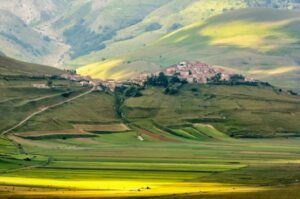
Norcia, a charming town in southeastern Umbria, Italy, is renowned for its rich history and stunning natural surroundings. Nestled in a wide plain near the Monti Sibillini mountain range, Norcia offers breathtaking views and a serene atmosphere. The town is famous for being the birthplace of St. Benedict, the founder of the Benedictine monastic order, and his twin sister, St. Scholastica. Norcia’s medieval architecture, including the Church of Saint Benedict and the Castellina fortress, adds to its historical allure. The town is also celebrated for its culinary delights, particularly its sausages and ham, known as norcineria. Whether you’re interested in history, nature, or gastronomy, Norcia has something to offer every visitor.
Palmanova, Friuli Venezia Giulia

Palmanova, located in the Friuli Venezia Giulia region of Italy, is a unique and fascinating town known for its distinctive star-shaped layout. Founded by the Venetian Republic in 1593, Palmanova was designed as an ideal Renaissance city and military fortress. The town’s nine-pointed star design, complete with ramparts and a surrounding moat, was intended to provide optimal defense against invaders. Today, Palmanova is recognized as a UNESCO World Heritage Site and is celebrated for its well-preserved fortifications and historical significance. Visitors can explore the central Piazza Grande, the impressive city gates, and the various museums that showcase the town’s rich history. Palmanova’s unique architecture and historical charm make it a must-visit destination for history enthusiasts and travelers alike.
Bosa, Sardinia
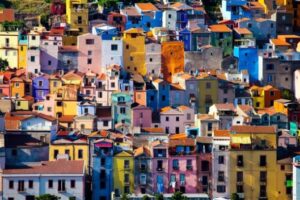
Bosa, a picturesque town on the west coast of Sardinia, Italy, is renowned for its vibrant, pastel-colored houses and rich history. Nestled along the Temo River, Bosa is dominated by the medieval Malaspina Castle, which offers stunning views of the town and surrounding landscape. The town’s charming streets are lined with historic buildings, including the Cathedral of Bosa and several other beautiful churches. Bosa is also known for its traditional crafts, such as leather tanning, and its delicious local cuisine. Whether you’re exploring its historical sites, enjoying the scenic riverfront, or indulging in local delicacies, Bosa offers a unique and memorable experience for visitors.
Otranto, Puglia
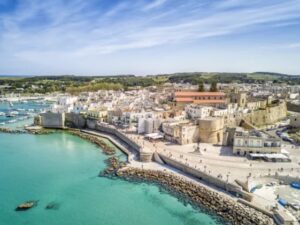
Otranto, a picturesque coastal town in the province of Lecce, Puglia, is renowned for its rich historical and cultural heritage. Located on the Adriatic Sea, it is the easternmost town in Italy and has long been a strategic maritime hub. The town’s historic center, enclosed by ancient defensive walls, is a maze of narrow streets filled with charming old buildings, bars, restaurants, and shops. Key landmarks include the Cathedral of Otranto, featuring an extraordinary 12th-century mosaic floor depicting the Tree of Life, and the imposing Aragonese Castle. Otranto’s beautiful beaches and crystal-clear waters make it a popular destination for tourists seeking both relaxation and a glimpse into Italy’s storied past.
Civita di Bagnoregio, Lazio
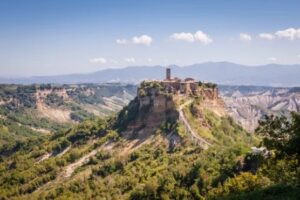
Civita di Bagnoregio, a small village in the Lazio region of Italy, is often referred to as “the dying city” due to its precarious position atop a crumbling tufa hill. Founded by the Etruscans over 2,500 years ago, this enchanting town is accessible only by a pedestrian bridge, adding to its secluded charm. The village’s medieval architecture, narrow streets, and stunning views of the surrounding Valle dei Calanchi create a picturesque and timeless atmosphere. Despite its dwindling population, Civita di Bagnoregio attracts numerous visitors who come to experience its unique beauty and historical significance. The town’s efforts to preserve its heritage have led to its inclusion in the list of “The Most Beautiful Villages of Italy”.
Whether you’re drawn to the coastal allure of Porto Venere, the medieval charm of Anghiari, or the unique architecture of Palmanova, Italy’s small towns offer something for every traveler. Each of these twelve destinations provides a distinctive blend of history, culture, and natural beauty, making them perfect spots to explore and enjoy the authentic Italian experience. As you plan your next trip to Italy, consider venturing off the beaten path to discover these remarkable towns, where timeless beauty and rich traditions await you at every turn.
Learn about the residence permit for digital nomads from non-EU countries working in Italy
Italy’s Investor Visa: A Visa to Attract Strategic Investments from Abroad
Find and Buy Your Ideal Property in Italy with Our Professional Services
Buying Property in Italy – How to Get a Mortgage as a Foreigner
How to Open a Bank Account in Italy as an Expat
Learn Italian and open up new possibilities for your career and personal growth
Prepare for the CILS B1 Citizenship exam to obtain citizenship by marriage, residence or study or work in Italy.
Switching to a self-employment permit from a study or job-seeking one
Understanding the Tessera Sanitaria: Your Italian Health Insurance Card
Non-Married Partners: How to Obtain a Residence Permit in Italy as De Facto Cohabitants
How to get tax identification number for foreign citizens (Codice Fiscale)
How to register in Italy as an EU citizen
Mastering Public Transport in Italy
The Advantages of Dual Citizenship with an Italian Passport: Unlocking Boundless Opportunities
What you need to know about Visas and Permits to stay in Italy
Red flags to identify a scam when renting in Italy
If you’re considering a move to Italy, you’re not alone. The country’s beautiful landscapes, rich culture, and delicious cuisine are just a few of the reasons why expats are drawn to Italy. However, moving to a new country can be a daunting process, and Italy is no exception. In this article, we’ll take a look at the pros and cons of moving to Italy, provide legal advice for expats, and discuss what you can expect from the Italian bureaucracy and processes.
Pros of Moving to Italy
Beautiful Scenery
From the rolling hills of Tuscany to the stunning coastlines of the Amalfi Coast, Italy’s natural beauty is hard to beat.
Rich Culture
Italy is famous for its art, music, fashion, and cuisine. As an expat, you’ll have the opportunity to immerse yourself in this rich culture and learn new skills and perspectives.
Food and Wine
Italy is a food lover’s paradise, with delicious pasta, pizza, gelato, and wine. As an expat, you’ll have access to some of the best food and wine in the world.
Quality of Life
Italy is known for its relaxed lifestyle, with plenty of opportunities for leisurely strolls, coffee breaks, and long dinners with friends.
Cons of Moving to Italy

Bureaucracy
The Italian bureaucracy can be slow and frustrating, and navigating the complex systems and processes can be challenging for expats – But the good thing is that you know us and we could help you get through the worst part of this with our Legal team!
Language Barrier
Although many Italians speak English, the language barrier can still be a hurdle for expats, particularly in more rural areas.
Cost of Living
Italy can be an expensive country to live in compared to others, particularly in major touristic cities like Rome and Milan. You can check online the cost of certain things in websites like Numbeo.
Unemployment
Italy has a relatively high unemployment rate, particularly among young people. Finding work as an expat can be difficult, particularly if you don’t speak Italian. Good thing you can check on our Facebook Group or Newsletter for any open position!
Legal Advice for Expats Coming to Italy
If you’re planning to move to Italy, it’s important to be aware of the legal requirements and processes involved. Here are some tips to help you get started:
• Obtain a Visa: Depending on your nationality and the purpose of your stay, you may need to obtain a visa before you can enter Italy. The Italian embassy or consulate in your home country can provide more information.
• Register with the Local Authorities: Once you arrive in Italy, you’ll need to register with the local authorities within eight days. This process is called the “residenza” and involves obtaining a codice fiscale (tax code) and registering your address with the local police.
• Obtain a Permesso di Soggiorno: If you plan to stay in Italy for more than three months, you’ll need to obtain a permesso di soggiorno (residence permit). This process can be complex and time-consuming, so it’s a good idea to seek legal advice.
• Understand Your Tax Obligations: If you’re working in Italy or earning income from Italian sources, you’ll need to pay taxes in Italy. It’s important to understand your tax obligations and seek advice from a professional if necessary.
Italian Bureaucracy and Processes
As mentioned earlier, the Italian bureaucracy can be slow and frustrating. Here are some tips to help you navigate the process:
• Be Patient: The Italian bureaucracy is known for its slow pace, so it’s important to be patient and persistent.
• Seek Help: If you’re struggling with the bureaucracy, don’t be afraid to seek help from a professional or a local Italian friend. Or you can also contact us and our legal team can give you a free call to discuss your situation! Email us at [email protected]
If you want to receive more information about this topic, make sure you subscribe to our Newsletter and don’t miss out on anything! We are here to help you feel at home.

Understanding Salaries in Italy: A Guide for Expats and Newcomers (2025)
If you’re an expat living in Italy or someone considering relocating, understanding the salary landscape remains a crucial element in planning your life in the country. This article provides an overview of average salaries in Italy, how they vary by profession, age, gender, education, and region, as well as how they compare to other European […]

Voters to Decide on June 8–9: Shorter Citizenship Wait and New Labor Protections
On Sunday, June 8, and Monday, June 9, 2025, Italian citizens eligible to vote will be called to the polls for a major referendum on five key issues affecting labor rights and citizenship. These abrogative referendums (under Article 75 of the Italian Constitution) allow voters to decide whether to repeal existing laws or specific legal […]

Conclave to Elect New Pope to Begin on May 7th
Following the passing of Pope Francis, a historic moment is once again unfolding in the heart of Rome. The Conclave to elect the 267th Pope will officially begin on May 7th, 2025, marking a major event in both the Catholic Church and Italian history. For expats living in Italy, understanding the significance of this process […]

Living in Abruzzo, Italy: Retirement, Lifestyle, and Cost of Living (2025 Guide)
Why Choose Abruzzo? Abruzzo, located in central Italy between the Adriatic Sea and the Apennine Mountains, is a dream destination for those looking to retire or relocate for a more relaxed and affordable lifestyle. Known for its stunning landscapes, charming medieval villages, national parks, and friendly locals, Abruzzo offers an authentic Italian experience—without the crowds […]

A Guide to Getting Married in Italy to an Italian (2025 Edition)
If you’re a foreigner planning to marry an Italian in Italy in 2025, there are important legal steps to follow. This guide walks you through the process: Legal Requirements • Both partners must be at least 18 years old • Neither partner can be currently married • Divorce or death certificates must be provided if previously married Documents […]

How to find an apartment in Rome: the ultimate expat guide
Guest Article written by helpmaterome.com Finding an apartment to rent in Rome is HARD. Demand for rentals is sky-high, so that little place you had your eye on last week has probably already gone by the time you pick up the phone to ask about it. You need to move quickly at all stages: calling, […]

Italy Observes Duelo: The Papal Demise and Transition
Italy has entered a period of official mourning, or duelo, following the passing of His Holiness Pope Francis I on April 21, 2025. For foreign residents within the capital, the customs and procedures associated with a papal demise and subsequent election may present unfamiliar traditions. This article endeavors to illuminate the role of the papacy, […]

Easter in Italy 2025: What to See, Eat, and Celebrate
Whether you’re religious or not, Easter is a great opportunity to visit Italy or acquire an Italian mindset. The weather is pleasant, and there are numerous intriguing customs to observe, ranging from sprinting monks and massive sculptures to colorful processions and larger-than-life reenactments. The Papal Mass and Urbi et Orbi Blessing in Vatican City The […]
Explore All the Exciting Things to Do in Rome and Italy this May, from the well-known attractions to hidden gems!
Welcome, expats living in Rome and Italy! You’ve made a fantastic decision to call this beautiful country home. We’ve compiled a list of the best things to do and the events happening in May to help you immerse yourself in the local culture. And, for those who are new to public transport in Italy, we’ve got you covered with some handy tips to make your travels stress-free.

May 1st: May Day Celebrations in Rome
May 1st is a national holiday known as International Workers’ Day, or May Day, which is widely celebrated across most European countries, similar to Labor Day.
Romans particularly enjoy this day as an opportunity to spend time outdoors, indulging in picnics or leisurely lunches with friends and family.
Here’s a list of what’s closed and open on May 1, 2023, in Rome:
Closed on May 1, 2023:
– Vatican Museums and Sistine Chapel
– Capitoline Museums
– Castel Sant’Angelo
– Ostia Antica
Open on May 1, 2023:
– Colosseum, Roman Forum, and Palatine Hill
– Galleria Borghese
– Saint Peter’s Basilica (as well as other churches)
– Galleria Doria Pamphilj
– The Pantheon
Tip: Take advantage of the holiday to explore Rome’s iconic sites and immerse yourself in the city’s vibrant atmosphere.
Primo Maggio Concert: A Celebration of Music in Rome
Start your May adventure with the annual Primo Maggio Concert held in Piazza San Giovanni. This free, open-air event features a diverse lineup of Italian and international artists. It’s an ideal opportunity to socialize with locals, dance the night away, and immerse yourself in Rome’s vibrant music scene.

Rome’s Secret Gardens: The Perfect Escape
Tired of the tourist crowds? Venture off the beaten path and discover Rome’s hidden parks. Villa Doria Pamphili, Villa Ada, and Parco degli Acquedotti offer serene settings for a relaxing picnic or leisurely stroll, allowing you to recharge amidst lush greenery.

Rome’s Blooming Roseto Rose Garden on Aventine Hill
The picturesque Roseto Rose Garden, nestled on the Aventine Hill in Rome, opens its gates to the public from April 21st through early June. In recent years, the garden has also been reopening for a couple of weeks in mid-October.
However, May is the ideal time to visit, as the roses reach their peak beauty, showcasing their magnificent full blooms. Not only is entry to the Roseto Rose Garden free of charge, but it also tends to be relatively uncrowded, making it the perfect serene escape amidst the bustling city.

Open House Roma
Hundreds of palaces, palazzos, ruins, and monuments in and around Rome are free to explore in May.
The dates for Open House Roma in 2023 are May 20-28.
Visit a variety of homes ranging from modern to old. The site is only in Italian, but you can view photographs of the numerous spots you may visit, and if you click on any of them, a map of their location will appear.
The Street Art Scene in Rome: A Visual Feast
Rome’s thriving street art scene adds a modern touch to the ancient city. Explore neighborhoods like Ostiense, Pigneto, and Tor Marancia to uncover striking murals, thought-provoking installations, and captivating graffiti. It’s a unique way to experience Rome’s contemporary culture.
Food Festivals: A Culinary Adventure
Food lovers, this one’s for you! May is the perfect time to indulge in Rome’s food festivals. Sample traditional Roman dishes at the Cacio e Pepe Festival or treat your taste buds to artisanal gelato at the Gelato Festival. These events provide a wonderful opportunity to savor Italy’s culinary delights and mingle with locals.
Night of the Museums: History Comes Alive
Witness Rome’s rich history in a new light during the Night of the Museums. This exclusive event allows you to explore Rome’s museums and cultural sites after dark, with many locations hosting special activities and performances. It’s a magical experience that shouldn’t be missed.
Check this list of participating museums: Capitoline Museums, Centrale Montemartini, Mercati di Traiano – Museo dei Fori Imperiali, Museo dell’Ara Pacis, Museo di Roma, Museo Napoleonico, Museo di Roma in Trastevere, Museo Pietro Canonica a Villa Borghese, Musei di Villa Torlonia (Casina delle Civette, Casino Nobile, Serra Moresca), Museo delle Mura, Museo Carlo Bilotti – Aranciera di Villa Borghese, Museo di Scultura Antica Giovanni Barracco, Museo Civico di Zoologia, Museo della Repubblica Romana e della memoria garibaldina, Galleria d’Arte Moderna, Museo di Casal de’ Pazzi and more.
There will be a lot of concerts and special performances and events happening in Rome too!
For the full list of the participating museums and sites, check out museiincomuneroma.it
Assisi’s Calendimaggio Festival: A Medieval Journey
Just a couple of hours away from Rome, the enchanting town of Assisi hosts the Calendimaggio Festival. This lively event celebrates the town’s medieval heritage with colorful parades, captivating theatrical performances, and traditional music. It’s a unique opportunity to step back in time and experience Italy’s rich history.

Giro d’Italia: A Thrilling Cycling Race
Witness one of the world’s most famous cycling races, Giro d’Italia, as it winds its way through Italy’s breathtaking countryside. Join locals in cheering on the cyclists and soak up the electric atmosphere. Check out the official website to get all the information and plan for your adventure!
The International Kite Festival in Cervia: A Sky Full of Colors
For a family-friendly day trip, head to the coastal town of Cervia for the International Kite Festival. This vibrant event showcases stunning kites from around the world, alongside flying displays and kite-making workshops. It’s a fun and unforgettable experience for all ages. Check the website for more information!
The Open Cellars Event: A Toast to Italy’s Wine Culture
On the last weekend of May, wineries across Italy open their doors to the public for the Open Cellars event. Embark on a scenic road trip through the country’s picturesque vineyards, sample exquisite wines, and learn about the winemaking process. This event is perfect for wine enthusiasts and those looking to explore Italy’s countryside.
Tips for Expats and Tourists Visiting Italy in May
Dress for the Weather and Cultural Norms
May in Italy brings pleasant temperatures and the beginning of the summer season. Pack lightweight, breathable clothing and comfortable walking shoes for daytime explorations. However, it’s essential to respect cultural norms, especially when visiting religious sites. Ensure you have a shawl, scarf, or a light jacket to cover your shoulders and wear modest clothing that covers your knees when entering churches or other sacred places. Don’t forget to pack a light rain jacket or umbrella, as May can occasionally bring showers.
Familiarize yourself with the local and regional transport system
To understand the schedule and routes for buses, trams, and trains in Italy can be tricky at first. Check out every city public transport website beforehand!
For example: Rome’s ATAC website and app provide valuable information on routes, schedules, and ticketing. You can purchase a Roma Pass or Integrated Time Ticket (B.I.T.) for unlimited access to Rome’s public transport network. These passes can save you money and make traveling more convenient.
When using trains to travel across Italy, consider purchasing a Trenitalia or Italo pass, depending on your route and travel frequency. Both companies offer a variety of ticket options to suit your needs.
Google Maps and Moovit are great apps to help you navigate public transport in Rome and other Italian cities. They provide real-time updates, route planning, and estimated travel times.
Keep in mind that some public transport services may have limited schedules during May holidays and local festivals. Always check timetables in advance to avoid delays.
Learn Basic Italian Phrases and Local Customs
While many Italians speak English, learning some basic Italian phrases will make your interactions with locals more enjoyable and help you navigate public transportation and restaurants more easily. Simple phrases like “Buongiorno” (good morning), “Grazie” (thank you), and “Dov’è il bagno?” (where is the bathroom?) can go a long way. Also, familiarize yourself with Italian customs, such as greetings, dining etiquette, and tipping practices, to ensure a smooth and culturally respectful experience.
We can help you with a free Italian lesson to get you ready for your next adventure in Italy!
In conclusion, Rome and Italy offer a wealth of exciting events, hidden gems, and unforgettable experiences for expats in May. With our comprehensive guide and public transport tips, you’ll be well-equipped to make the most of your time in this captivating country. Embrace your new home, and happy exploring!
Don’t miss out on our latest updates and legal advice for expats in Italy. Check out our Social Media accounts and Newsletter so you can join us in the next Social Meet-ups for Expats!

Understanding Salaries in Italy: A Guide for Expats and Newcomers (2025)
If you’re an expat living in Italy or someone considering relocating, understanding the salary landscape remains a crucial element in planning your life in the country. This article provides an overview of average salaries in Italy, how they vary by profession, age, gender, education, and region, as well as how they compare to other European […]

Voters to Decide on June 8–9: Shorter Citizenship Wait and New Labor Protections
On Sunday, June 8, and Monday, June 9, 2025, Italian citizens eligible to vote will be called to the polls for a major referendum on five key issues affecting labor rights and citizenship. These abrogative referendums (under Article 75 of the Italian Constitution) allow voters to decide whether to repeal existing laws or specific legal […]

Conclave to Elect New Pope to Begin on May 7th
Following the passing of Pope Francis, a historic moment is once again unfolding in the heart of Rome. The Conclave to elect the 267th Pope will officially begin on May 7th, 2025, marking a major event in both the Catholic Church and Italian history. For expats living in Italy, understanding the significance of this process […]

Living in Abruzzo, Italy: Retirement, Lifestyle, and Cost of Living (2025 Guide)
Why Choose Abruzzo? Abruzzo, located in central Italy between the Adriatic Sea and the Apennine Mountains, is a dream destination for those looking to retire or relocate for a more relaxed and affordable lifestyle. Known for its stunning landscapes, charming medieval villages, national parks, and friendly locals, Abruzzo offers an authentic Italian experience—without the crowds […]

A Guide to Getting Married in Italy to an Italian (2025 Edition)
If you’re a foreigner planning to marry an Italian in Italy in 2025, there are important legal steps to follow. This guide walks you through the process: Legal Requirements • Both partners must be at least 18 years old • Neither partner can be currently married • Divorce or death certificates must be provided if previously married Documents […]

How to find an apartment in Rome: the ultimate expat guide
Guest Article written by helpmaterome.com Finding an apartment to rent in Rome is HARD. Demand for rentals is sky-high, so that little place you had your eye on last week has probably already gone by the time you pick up the phone to ask about it. You need to move quickly at all stages: calling, […]

Italy Observes Duelo: The Papal Demise and Transition
Italy has entered a period of official mourning, or duelo, following the passing of His Holiness Pope Francis I on April 21, 2025. For foreign residents within the capital, the customs and procedures associated with a papal demise and subsequent election may present unfamiliar traditions. This article endeavors to illuminate the role of the papacy, […]

Easter in Italy 2025: What to See, Eat, and Celebrate
Whether you’re religious or not, Easter is a great opportunity to visit Italy or acquire an Italian mindset. The weather is pleasant, and there are numerous intriguing customs to observe, ranging from sprinting monks and massive sculptures to colorful processions and larger-than-life reenactments. The Papal Mass and Urbi et Orbi Blessing in Vatican City The […]
Moving to Italy is a dream for many expats, but choosing the right city can be a challenge. In this article, we’ll explore some of the best cities for expats in Italy, including Rome, Florence, Milan, and Bologna. We’ll also provide tips for getting a stable life in Italy, from finding a job to learning the language.
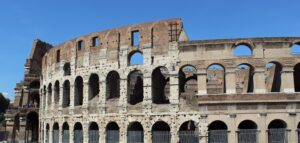
Italy is a country of charm, beauty, and history, and it’s no surprise that many people dream of living there. Each city in Italy offers a unique experience for expats, from the romantic streets of Florence to the cosmopolitan vibe of Milan. In this article, we’ll explore the top cities for expats in Italy and explain why they are great places to call home.
Rome: The Eternal City
Rome is a city of art, architecture, and history, with world-famous landmarks such as the Colosseum, the Pantheon, and the Vatican. Expats in Rome can immerse themselves in the rich culture of the city and enjoy its many museums, art galleries, and cultural events. The city is also known for its relaxed and laid-back lifestyle, making it a great place to enjoy la dolce vita.
Bonus: Why Rome is the Best City for Expats in Italy
• Cultural Heritage: Rome is a city of art, architecture, and history, with world-famous landmarks such as the Colosseum, the Pantheon, and the Vatican. Expats in Rome can immerse themselves in the rich culture of the city and enjoy its many museums, art galleries, and cultural events.
• Lifestyle: Rome is known for its relaxed and laid-back lifestyle, with plenty of opportunities for leisurely strolls, coffee breaks, and long dinners with friends. Expats in Rome can enjoy the city’s lively social scene and warm, welcoming culture.
• Job Opportunities: Rome offers a range of job opportunities for expats, particularly in the fields of education, hospitality, and tourism. The city is also home to many international companies, making it a great place to start a career.
• Affordable Living: While Rome is not the cheapest city in Italy, it’s still more affordable than other major cities like Milan and Venice. Expats in Rome can find affordable housing, food, and transportation, allowing them to live comfortably on a budget.
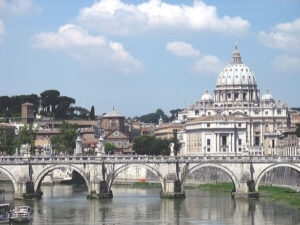
Florence: The Birthplace of the Renaissance
Florence is a city of beauty and culture, with stunning architecture, world-class museums, and delicious cuisine. Expats in Florence can explore the city’s many historic landmarks, such as the Uffizi Gallery and the Duomo, and enjoy the vibrant arts and music scene. The city is also known for its warm, welcoming culture and strong sense of community.
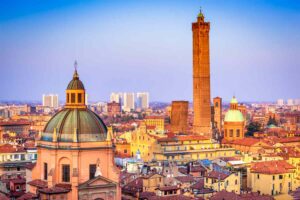
Milan: The Fashion Capital of Italy
Milan is a city of style and sophistication, with a cosmopolitan vibe and a thriving fashion and design scene. Expats in Milan can enjoy the city’s high-end shopping, gourmet cuisine, and vibrant nightlife. The city is also home to many international companies, making it a great place to start a career.
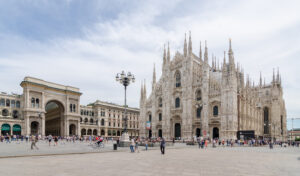
Bologna: The Foodie Capital of Italy
Bologna is a city of food and wine, with a rich culinary tradition that dates back centuries. Expats in Bologna can enjoy the city’s famous cuisine, including dishes such as tortellini and ragù alla bolognese, and explore the many local markets and food festivals. The city is also known for its lively social scene and friendly, welcoming culture.
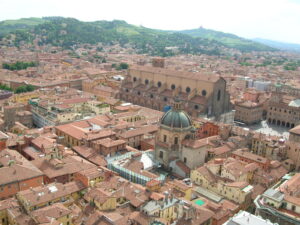
Tips for Getting a Stable Life in Italy
• Learn the Language: Italian is the official language of Italy, and while many people in these cities speak English, it’s still important to learn the language to fully immerse yourself in the culture and make connections with locals. You can get more info about a free Italian lesson with us by sending us an email!
• Find a Job: Finding a job in Italy can be challenging, but these cities offer a range of job opportunities in fields such as education, hospitality, and tourism. Networking and building relationships with locals can also be helpful.
• Get a Residence Permit: Expats in Italy must obtain a residence permit (permesso di soggiorno) to stay in the country for more than three months. This can be a complex process, so it’s important to seek legal advice and start the process early.
• Embrace the Culture: Italy has a unique culture, and embracing it is key to getting a stable life in the country. This includes learning the language, enjoying the food and wine, and participating in local festivals and events.
In conclusion, moving to Italy can be a wonderful adventure, and these cities offer a range of opportunities for expats to create a stable life for themselves. From the history and charm of Rome, to the beauty and culture of Florence, the style and sophistication of Milan, and the food and wine of Bologna, there’s a city in Italy that’s perfect for every expat.
If you’re considering a move to Italy, it’s important to seek legal advice to ensure a smooth transition. At Expat Living In Rome, we specialize in helping expats navigate the complexities of Italian law and bureaucracy. Our team of experienced lawyers can assist you with obtaining a residence permit, finding a job, and settling into your new life in Italy.
Don’t miss out on our latest updates and legal advice for expats in Italy. Subscribe to our newsletter today and stay informed about the latest developments in Italian law and culture. With the right preparation and guidance, you can enjoy la dolce vita in one of Italy’s beautiful cities.
Contact us today to learn more!

Understanding Salaries in Italy: A Guide for Expats and Newcomers (2025)
If you’re an expat living in Italy or someone considering relocating, understanding the salary landscape remains a crucial element in planning your life in the country. This article provides an overview of average salaries in Italy, how they vary by profession, age, gender, education, and region, as well as how they compare to other European […]

Voters to Decide on June 8–9: Shorter Citizenship Wait and New Labor Protections
On Sunday, June 8, and Monday, June 9, 2025, Italian citizens eligible to vote will be called to the polls for a major referendum on five key issues affecting labor rights and citizenship. These abrogative referendums (under Article 75 of the Italian Constitution) allow voters to decide whether to repeal existing laws or specific legal […]

Conclave to Elect New Pope to Begin on May 7th
Following the passing of Pope Francis, a historic moment is once again unfolding in the heart of Rome. The Conclave to elect the 267th Pope will officially begin on May 7th, 2025, marking a major event in both the Catholic Church and Italian history. For expats living in Italy, understanding the significance of this process […]

Living in Abruzzo, Italy: Retirement, Lifestyle, and Cost of Living (2025 Guide)
Why Choose Abruzzo? Abruzzo, located in central Italy between the Adriatic Sea and the Apennine Mountains, is a dream destination for those looking to retire or relocate for a more relaxed and affordable lifestyle. Known for its stunning landscapes, charming medieval villages, national parks, and friendly locals, Abruzzo offers an authentic Italian experience—without the crowds […]

A Guide to Getting Married in Italy to an Italian (2025 Edition)
If you’re a foreigner planning to marry an Italian in Italy in 2025, there are important legal steps to follow. This guide walks you through the process: Legal Requirements • Both partners must be at least 18 years old • Neither partner can be currently married • Divorce or death certificates must be provided if previously married Documents […]